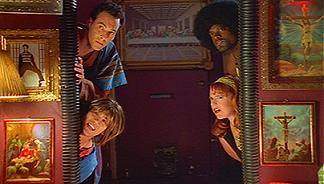Gory Gory Hallelujah


The premise for Gory Gory Hallelujah is absolutely hilarious. Four people rejected for the role of Jesus Christ go on a cross-country road trip to look for more roles. Those four happen to consist of a woman, a Jew, a militant black man, and a free-love hippie. Yes, this is a B-movie and damned proud of it. It has the necessary over-the-top premise, but tends to lag a bit in the middle before a rousing ending. Sky (Tim Gouran, Love My Guts), Joshua (Todd Licea, Open House, Red Man), Jessie (Angie Louise), and Rahim (Jeffrey Gilbert, Leave It!) all discover that the director finds them lacking in one way or another. Sky hears about an audition for Jesus Christ, Superstar in another state, and the four take off in search of better times.
Director Sue Corcoran and writer Louise effectively capture a weird, day-glo retro world in the film. It is campy, fun, and heck, even has a musical number at the end. However, they have the four take a detour, after fighting a barful of drunk Elvises, to a puritanical town bent on destroying these deviants. A black man! A Jew! A bisexual! How dare they exist? This part of Gory Gory Hallelujah is overplayed, as Corcoran and Louise expose the actual seamy underbelly of what looks like a quaint town. Sky, Joshua, Jessie, and Rahim must decide what is most important for them as they find their lives in danger from various townsfolk.
Aside from the script, much of Gory Gory Hallelujah stands up pretty well. The four main characters give amusing performances, exaggerating all of their key stereotypes, and Corcoran maintains a sense of fun for the bulk of the film. And for good measure she throws in a glowing phallus, some token nudity, and a bunch of zombies. The acting and production value is pretty decent given what type of film this was, and Corcoran makes sure everything stays consist for the duration of the film.
But the test of any genre film like this is how fun it is. Again, the beginning, especially the audition process, and the end, where all hell breaks loose, are amusing, but the middle is problematic. Corcoran wants to slow down and begin building up towards the ending. The levity wanes a bit, as Gory Gory Hallelujah almost begins to sound preachy about the evils of intolerance, but there is enough wackiness to make sure it never gets close to falling off the deep end. It's all enough to make people smile, which is presumably exactly what Corcoran and Louise (also known as the Von Piglet Sisters) wanted.